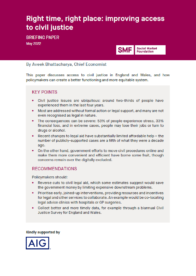This paper discusses access to civil justice in England and Wales, and how policymakers can create a better functioning and more equitable system.
KEY POINTS
- Civil justice issues are highly common: around two-thirds of people have experienced them in the last four years.
- Most are addressed without formal action or legal support, and many are not even recognised as legal in nature.
- The consequences can be severe: 53% of people experience stress, 33% financial loss, and in extreme cases, people may lose their jobs or turn to drugs or alcohol.
- Recent changes to legal aid have substantially limited affordable help – the number of publicly-supported cases are a fifth of what they were a decade ago.
- On the other hand, government efforts to move civil procedures online and make them more convenient and efficient have borne some fruit, though concerns remain over the digitally excluded.
RECOMMENDATIONS
Policymakers should:
- Reverse cuts to civil legal aid, which some estimates suggest would save the government money by limiting expensive downstream problems.
- Prioritise early, joined-up interventions, providing resources and incentives for legal and other services to collaborate. An example would be co-locating legal advice clinics with hospitals or GP surgeries.
- Collect better and more timely data, for example through a biannual Civil Justice Survey for England and Wales.

DOWNLOAD THE BRIEFING PDF
Kindly sponsored by

